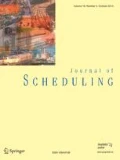Abstract
Sports scheduling is a very attractive application area not only because of the interesting mathematical structures of the problems, but also due to their importance in practice and to the big business that sports have become. In this paper, we introduce the Traveling Tournament Problem with Predefined Venues, which consists in scheduling a compact single round robin tournament with a predefined venue assignment for each game (i.e., the venue where each game takes place is known beforehand) while the total distance traveled by the teams is minimized. Three integer programming formulations are proposed and compared. We also propose some simple enumeration strategies to generate feasible solutions to real-size instances in a reasonable amount of time. We show that two original enumeration strategies outperform an improvement heuristic embedded within a commercial solver. Comparative numerical results are presented.
Similar content being viewed by others
References
Anagnostopoulos, A., Michel, L., Van Hentenryck, P., & Vergados, Y. (2006). A simulated annealing approach to the traveling tournament problem. Journal of Scheduling, 9, 177–193.
Danna, E., Rothberg, E., & Le Pape, C. (2005). Exploring relaxation induced neighborhoods to improve mip solutions. Mathematical Programming, 102, 71–90.
Duarte, A., Ribeiro, C. C., & Urrutia, S. (2007). A hybrid ILS heuristic to the referee assignment problem with an embedded MIP strategy. In Th. Bartz-Beielstein, M.J. Blesa, C. Blum, B. Naujoks, A. Roli, G. Rudolph, & M. Sampels (Eds.), Lecture notes in computer science : Vol. 4771. Hybrid metaheuristics, 4th international workshop (pp. 82–95). Berlin: Springer.
Durán, G., Noronha, T. F., Ribeiro, C. C., Souyris, S., & Weintraub, A. (2007). Branch-and-cut for a real-life highly constrained soccer tournament scheduling problem. In E. Burke, & Rudová H. (Eds.), Lecture notes in computer science : Vol. 3867. Practice and theory of automated timetabling VI (pp. 174–186). Berlin: Springer.
Easton, K., Nemhauser, G. L., & Trick, M. A. (2001). The traveling tournament problem: Description and benchmarks. In T. Walsh (Ed.), Lecture notes in computer science : Vol. 2239. Principles and practice of constraint programming (pp. 580–584). Berlin: Springer.
Easton, K., Nemhauser, G. L., & Trick, M. (2003). Solving the traveling tournament problem: A combined integer programming and constraint programming approach. In G. Goos, J. Hartmanis, & J. van Leeuwen (Eds.), Lecture notes in computer science : Vol. 2740. Practice and theory of automated timetabling IV (pp. 100–109). Berlin: Springer.
Easton, K., Nemhauser, G. L., & Trick, M. (2004). Sports scheduling. In J.T. Leung (Ed.), Handbook of scheduling: algorithms, models and performance analysis (pp. 52.1–52.19). Boca Raton: CRC Press.
Henz, M. (1999) Constraint-based round robin tournament planning. In D. De Schreye (Ed.) International conference on logic programming (pp. 545–557), New Mexico.
Knust, S. (2007). Scheduling non-professional table-tennis leagues (Technical Report 270). Osnabrücker Schriften zur Mathematik.
Knust, S., & von Thaden, M. (2006). Balanced home-away assignments. Discrete Optimization, 3, 354–365.
Miyashiro, R., Iwasaki, H., & Matsui, T. (2003). Characterizing feasible pattern sets with a minimum number of breaks. In G. Goos, J. Hartmanis, & J. van Leeuwen (Eds.), Lecture notes in computer science : Vol. 2740. Practice and theory of automated timetabling IV (pp. 78–99). Berlin: Springer.
Nemhauser, G. L., & Trick, M. A. (1998). Scheduling a major college basketball conference. Operations Research, 46, 1–8.
Rasmussen, R. V., & Trick, M. A. (2006). The timetable constrained distance minimization problem. In J.C. Beck, & B.M. Smith (Eds.), Lecture notes in computer science : Vol. 3990. Integration of AI and OR techniques in constraint programming for combinatorial optimization problems (pp. 167–181). Berlin: Springer.
Rasmussen, R. V., & Trick, M. A. (2008). Round robin scheduling—a survey. European Journal of Operational Research, 188, 617–636.
Régin, J. (2001). Minimization of the number of breaks in sports scheduling problems using constraint programming. DIMACS Series in Discrete Mathematics and Theoretical Computer Science, 57, 115–130.
Ribeiro, C. C., & Urrutia, S. (2007a). Heuristics for the mirrored traveling tournament problem. European Journal of Operational Research, 179, 775–787.
Ribeiro, C. C., & Urrutia, S. (2007b). Scheduling the Brazilian soccer championship. In E. Burke, & H. Rudová (Eds.), Lecture notes in computer science : Vol. 3867. Practice and theory of automated timetabling VI (pp. 149–159). Berlin: Springer.
Rothberg, E. (2007). An evolutionary algorithm for polishing mixed integer programming solutions. INFORMS Journal on Computing, 19, 534–541.
Trick, M. (2007). Challenge traveling tournament instances. Online reference at http://mat.gsia.cmu.edu/TOURN/, last visited on August 10, 2007.
Author information
Authors and Affiliations
Corresponding author
Additional information
Work of R.A. Melo was partially funded by a CAPES scholarship. Work of C.C. Ribeiro was supported by CNPq research grants 301.694/2007-9 and 485.328/2007-0, and by FAPERJ research grant E-152.522/2006.
Rights and permissions
About this article
Cite this article
Melo, R.A., Urrutia, S. & Ribeiro, C.C. The traveling tournament problem with predefined venues. J Sched 12, 607–622 (2009). https://doi.org/10.1007/s10951-008-0097-1
Received:
Accepted:
Published:
Issue Date:
DOI: https://doi.org/10.1007/s10951-008-0097-1




